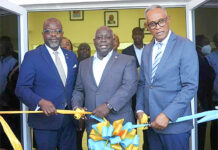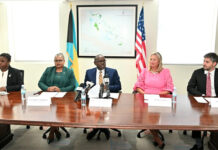The Ratification and Presentation Ceremony of the Maritime Labour Convention was held Monday, February 11, 2008 at the Ministry of Foreign Affairs, Goodman’s Bay Corporate Centre, Cable Beach, West Bay Street. Pictured from left are Minister of Maritime Affairs and Labour, Senator the Hon. Dion Foulkes; Director of the ILO International Labour Standards Department, Dr. Cleopatra Doumbia-Henry; and Deputy Prime Minister and Minister of Foreign Affairs, the Hon. Brent Symonette. (Photo/Raymond A. Bethel)
By: Lindsay Thompson
NASSAU, Bahamas – The Bahamas has ratified the International Maritime Labour Convention 2006, becoming the first country in the Western Hemisphere to move towards improving standards and conditions for the maritime industry.
The Bahamas received the Instrument of Ratification from Dr. Cleopatra Doumbia-Henry, Director of the International Labour Standards Department of the ILO, at a signing ceremony at the Ministry of Foreign Affairs on Monday, February 11.
Deputy Prime Minister and Minister of Foreign Affairs the Hon. Brent Symonette said, “The signing and ratification of this Convention is another clear indication of The Bahamas’ ongoing commitment to maritime safety and good labour practice.
“Indeed, a well-trained maritime labour force governed by just, fair and equitable laws will not only rebound to the good quality of the register but will also ensure the sustainability of best practice and standards in maritime affairs,” he noted.
Mr. Symonette said The Bahamas is pleased to be among the first countries to ratify this important Convention, which he said “speaks emphatically to our strong commitment to be in the forefront of maritime safety in an ever-changing sector.”
The Bahamas has the third largest ship registry in the world with over 1,700 vessels. The second largest, Liberia, has ratified the MLC 2006. Panama, the largest ship registry, is also expected to ratify the Convention this month.
Ratification of MLC 2006 is part of the United Nations Millennium Development Goals slated to take effect by 2010.
The MCL, which sets out the conditions for decent work in the maritime sector, was adopted on February 23, 2006, at the 94th International Labour Conference. The new Convention consolidates and updates 68 existing ILO maritime Conventions and recommendations adopted since 1920.
Among the novel features of the Convention are its form and structure, which include legally binding standards accompanied by non-mandatory guidelines. It departs significantly from that of traditional ILO Conventions.
The Convention is to become what has been called the “fourth pillar” of the international regulatory regime for shipping, completing the key conventions of the International Maritime Organisation.
The Convention sets minimum requirements for seafarers to work on a ship and contains provisions on conditions of employment, hours of work and rest, accommodation, recreational facilities, food and catering, health protection, medical care, welfare and social security protection.
Compliance and enforcement are secured through a number of mechanisms such as onboard and onshore compliant procedures for seafarers; through provisions regarding ship owners’ and shipmasters’ supervision of conditions on their ships, flag States’ jurisdiction and control over their ships, as well as port State inspection of foreign ships.
The convention also provides for a maritime labour certificate, which can be issued to ships once the flag State has verified that labour conditions on board a ship comply with national laws and regulations implementing the convention.
The Bahamas has been a member of the International Maritime Organisation Council since 1999 and is party to its principal safety and environmental Conventions. The Bahamas is also party to most major ILO conventions.
Minister of Labour and Maritime Affairs the Hon. Dion Foulkes said one of the advantages the Ministry of Labour and Maritime Affairs has, is that it straddles both sides on this particular issue.
“We have consulted very thoroughly with our ship owners (headquarters in London), and we have canvassed our clients and they are in full agreement with the terms of the Convention,” Mr. Foulkes said.
Dr. Doumbia-Henry, Director of the International Labour Standards Department of the ILO, said that ratification “demonstrates a sound commitment by The Bahamas to the realisation of the objectives of the ILO; the pursuit of social justice through respect for principles and rights at work.”
With this ratification and once the Convention enters into force, The Bahamas will become an automatic and voting member of the Special Tripartite Committee created under the Convention.
“The Bahamas has shown leadership with this ratification in leading the way for others to follow,” she said. “This ratification should also help stir on other Caribbean States with maritime interest to follow in the footsteps of The Bahamas. The Bahamas could assist these countries.”
The ratification should also give a boost to the on-going tripartite discussion on the adoption by The Bahamas of a Decent Work Country Programme, the first for a country in the region, said Dr. Doumbia-Henry.
The ratification brings to 35 the number of international labour Conventions ratified by The Bahamas, of which 31 are in force. They include the ratification of the eight ILO fundamental Conventions and two of the priority Conventions.
“The Convention has an extremely high threshold for coming into force, which is 30 countries, representing 33 percent of world gross tonnage. With the tonnage of The Bahamas, we would be very close to 20 percent of world gross tonnage and therefore it would be much easier to see in a very short timeframe, the entry into force of the Convention,” Dr. Doumbia-Henry said.
Once the Convention comes into force, it will become globally acceptable irrespective of ratification by all countries concerned. All 27 countries of the European Council are also expected to ratify the MLC, 2006 by 2010.








